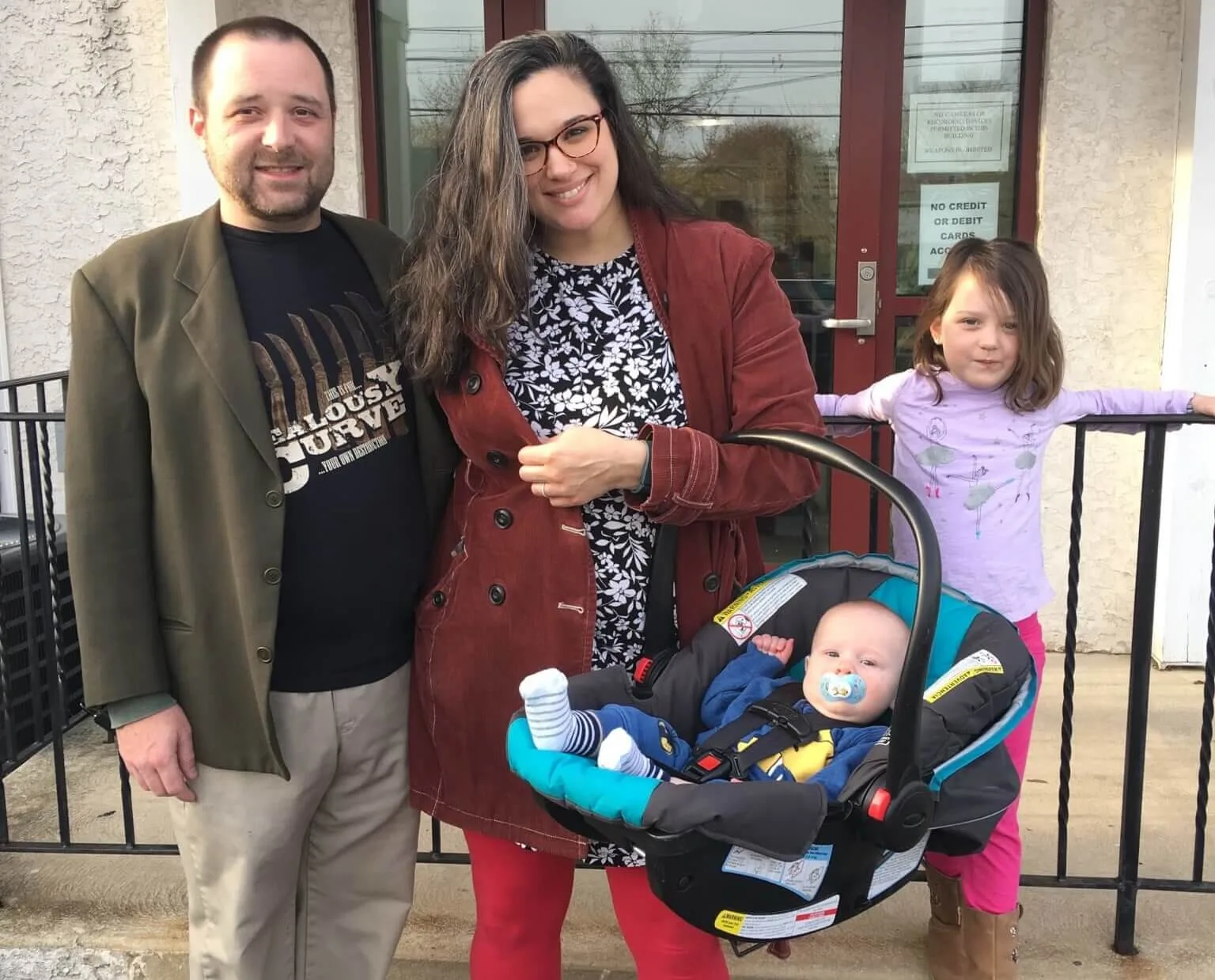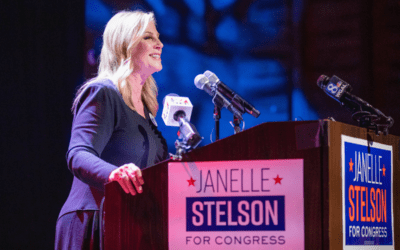
Image via Jessica Morrison
The final monthly payment of the child tax credit arrived last week—families will get another six months’ worth when they file their taxes in 2022—but President Joe Biden and Democrats in Congress want to extend the provision another year through the Build Back Better Act.
For more than a year, Jessica Morrison had white-knuckled her way through a pandemic, working full time, and trading off childcare shifts with her husband, Jason. The 37-year-old mother of two was—like so many Pennsylvanians—stressed, tired, and worried about money.
Then, in August, amid a rise in inflation, she learned that Jason’s car needed about $800 in repairs. While that would be a major inconvenience for anyone, it represented a financial threat for the family.
Because of the exorbitant cost of daycare in Pennsylvania, Jason takes care of the couple’s toddler during the day while Jessica works remotely as a social worker for the commonwealth. When Jessica finishes her work day, Jason hits the road, working as a rideshare driver for Uber and Lyft; his car is his livelihood.
It’s “really important that his car is safe and has up-to-date inspection so he can make money,” Jessica Morrison said. “A bill like that would have crippled us for months if we paid all of it with our own money, or it would have sat building interest if we had used our credit card.”
Instead, the Upper Darby Township family was able to use money they received from President Joe Biden’s expanded child tax credit to help cover the cost of repairs. Beginning in July, the Morrisons and 1.3 million other Pennsylvania families started receiving $250 to $300 a month for each child under the age of 17. Morrison and her husband, who have a 2-year-old son and a 7-year-old daughter, have received $550 a month.
The payments have been life-changing.
“We make under $100,000 between the two of us, and that’s huge for us. It really has made such a difference, even more than I would have anticipated, actually,” Morrison said. “And with the inflation, of course, that’s been extremely helpful.”
The monthly payments have helped the couple navigate the rising costs of gas and food and relieved a lot of stress. This sort of impact isn’t uncommon. Ashley McBride, the state director for the progressive advocacy group For Our Future Pennsylvania, said her team has connected with thousands of families in recent months and heard stories about the child tax credit’s positive benefits.
“Sometimes what separates a family from being able to make it is literally a few hundred dollars,” McBride said. “People are just talking about what it means to be able to fill up their gas, what it means to be able to provide good healthy food because you can afford it, what it means to be able to have safe child care.”
The payments have also been a huge help to Sarah Murphy of North Braddock, Allegheny County. The 48-year-old single mother lost her part-time job as an apartment cleaner a few months before the pandemic began, and has been nervous to return to work due to medical issues. She gets by on monthly disability checks that cover her rent and utilities, but leave room for little else. Living on a tight budget means rising expenses are a real issue as she struggles to provide for her 9-year-old son.
“You go to the grocery store and [you’re] like, ‘hold up, my little bit of money doesn’t go as far.’ Just the cost of bleach, Clorox alone, probably went up, like, $2 in two years,” Murphy said.
She’s used the child tax credit payments for food, masks and cleaning supplies, internet bills, and clothes for her son. “It’s not enough for you to get rich off or pass along in a trust to your kids, but it does help to have that little extra cushion,” Murphy said.

These stories and others like them underscore the nuanced reality of America’s economy: Inflation has hit families hard, but things would be far worse without policies like the child tax credit and the $1,400 stimulus checks that Democrats sent to families earlier this year.
“This additional money really helps them,” said Marc Stier, director of the Pennsylvania Budget and Policy Center. “Without the stimulus checks, without the child tax credit checks … the economic recovery would be slower.”
The final monthly payment of the child tax credit arrived last week—families will get another six months’ worth when they file their taxes in 2022—but Biden and Democrats in Congress want to extend the provision another year through the Build Back Better Act. The popular legislation also aims to provide access to affordable child care, fund free pre-K for 3- and 4-year-olds, and invest in other policies to help working- and middle-class Pennsylvanian families save money.
“If you want to know what we can do to reduce inflation that we’re seeing right now, passing Build Back Better … will certainly do that,” Stier said. “That relieves a lot of financial burden for families, and makes it easier for people to get back into the workforce.”
Ongoing child tax credit payments would ease immediate financial burdens for families, while the childcare spending caps and universal pre-K programs would allow many parents who’ve been forced to leave the workforce or reduce their hours since the pandemic began—the majority of whom are women—to return to work full-time. This would expand the workforce, which will moderate wage increases, boost supply, reduce the cost of goods and services, and therefore reduce inflation.
Biden’s Policies Are Helping Families, Not Hurting Them
As prices have increased, Republicans have wasted no time blaming Biden’s policies for driving inflation and encouraging people not to work. In reality, inflation is happening in virtually every developed country. Many experts, including Sabri Yilmaz, a professor of economics at Penn State University’s School of Business Administration, believe it’s temporary.
“I expect that the economy will again bounce back to normal in terms of lower gas prices and other essentials,” Yilmaz said, estimating it would take a few more months to do so.
The pain that families are feeling during these months is real, but so, too, is the impact of Biden’s efforts. The child tax credit payments have reduced the number of families without food, helped families pay off debts, and increased consumer spending without having a negative effect on unemployment.
It’s true that cash payments have contributed to a rise in consumer demand for goods at a time when countries the world over are experiencing supply chain issues—a mismatch that plays a part in inflation. But that’s only part of the picture.
Conveniently, Republican politicians have little to say about the other factors driving inflation: faulty supply-chain processes driven by years of deregulation and offshoring of jobs; corporate greed driving record profits; and the decades-long exploitation of low-wage workers, which in 2021, has prompted droves of people to unionize, walk off the job, or quit in search of better-paying jobs.
Moreover, 800,000 Americans have died during the pandemic, and about 1 million more have been incapicitated. That, too, has impacted the workforce and the cost of goods and services.
But to hear critics tell it, the rising cost of living is all Biden’s fault. According to Stier, however, the president’s efforts have not only helped families weather the inflation storm, but prevented further economic crises.
“It’s certainly true that if the economy were still down in the dumps, if we still had 15% unemployment, if people were being evicted from their homes and people were being foreclosed in their homes, we wouldn’t have inflation,” he explained. “But people need to ask themselves: Are we better off with an economic recovery that’s generated a temporary burst of inflation? Or are we better off with a deeply depressed economy?”
Ashley Putnam, director of the Federal Reserve Bank of Philadelphia’s Economic Growth and Mobility Project, agrees the cash payments have been a huge boost for families—particularly those whose income is in the bottom 20%—and the overall economy.
“They spend that money often on small businesses and their communities,” Putnam said. “Those small businesses that maybe were struggling in the pandemic are now doing better and they then employ people from that community. We really do see some regional positive things that happen as a result of low and moderate-income families having more money in their pockets and experiencing a little more stability than they did previously.”
The credits have real benefits for families, and not just financial ones. Morrison, for example, said she and her husband worry less about money and are able to spend more time together despite their opposing work schedules.
“My husband’s portion of the mortgage is roughly $700 a month. What he would do before that credit started coming in is about a week or two before the mortgage was due, he would go crazy and just work, work, work, work, work and we barely saw him and it was really stressful,” Morrison said. “With this $550 coming in, he can do it at a slower pace … We don’t use that money to pay the mortgage; he still covers his half of the mortgage. It’s just that it makes it so that he doesn’t have to totally break his neck and completely ignore his family for two weeks.”
Perhaps the most remarkable benefit of the expanded child tax credit has been its impact on child poverty. The monthly payments have lifted an estimated 140,000 children in Pennsylvania out of poverty, according to estimates from Stier’s Pennsylvania Budget and Policy Center.
While the child tax credit has been hugely consequential for Pennsylvanians, those families that have emerged out of poverty risk falling right back in unless the payments are extended.
“Poverty is not a static experience,” Putnam said. “Most families move in and above and out of the poverty line, and so having … some of these social safety nets is really, really critical.”
The Urgency of Extending the Child Tax Credit and Passing Build Back Better
The US House, including every Democratic member of Pennsylvania’s congressional delegation, already voted to extend the child tax credit as part of the Build Back Better Act. Not a single Pennsylvania Republican voted for the bill, despite its popularity among residents of the commonwealth. The bill is now in the Senate, where it’s once again being opposed by every Republican.
The majority of Senate Democrats are eager to pass the bill, but a few conservative Democrats—namely Joe Manchin of West Virginia—have put up hurdles. Manchin has parroted Republican talking points and raised concerns about the bill contributing to inflation, even as dozens of leading economists have argued Biden’s policies would prevent further inflation over the long term.

They would also provide enormous help to families. A recent analysis from the centrist think tank Third Way found that a Pennsylvania family of four earning the median state income of $105,032 would get a tax cut and experience savings of $7,350 per year thanks to the child tax credit extension, a cap that limits spending on child care programs to 7% of income, and subsidies to make Pennie marketplace healthcare plans more affordable. For single parents, the savings would be even greater, surpassing $15,000 per year.
The bill would also establish funding for pre-K programs for children. Notably, it does all this by raising taxes only on corporations and the top 1% of income earners. All other Pennslyvanians would effectively get a tax cut.
In tackling childcare costs, the bill addresses a long-standing problem that has become a crisis during the pandemic. Childcare in Pennsylvania costs upwards of $11,800 for infants and nearly $10,000 for four-year-olds.
While her daughter will qualify for a subsidized child care program when she turns four, Morrison can’t afford to pay for daycare right now, which is why she and her husband have to work opposite shifts.
“My husband really doesn’t have any choice but to have a job like the one he’s doing,” she said. “He has to be able to make his own schedule, so he’s pretty limited as to what he can do.”
If the measures included in the Build Back Better bill were in effect right now, Morrison and her husband could afford to send their son to daycare. That would allow Jason to find a regular 9-to-5 job, and give them time together as a family every night. “We would love something like that. That would be so great,” Morrison said.
This is the exact sort of scenario advocates envision happening if Build Back Better becomes law.
The economic argument for Biden’s bill is strong, but for McBride, the state director of For Our Future PA, the moral imperative is even stronger.
“We have a responsibility to invest in the American people, to invest in Pennsylvania … Some of the things that people are suffering from, that people are making decisions about are just inhumane.” she said. “It is necessary.”

For Rep. Susan Wild, supporting PA families includes reproductive rights and much more
Rep. Susan Wild wants to be very clear with Pennsylvanians: Donald Trump is committed to taking away women’s reproductive freedom, but he is not...

School districts working with anti-LGBTQ groups can cost your kids’ schools millions
Parents across South Central Pennsylvania are worried about the potential financial impacts working with anti-LGBTQ groups may have on their school...

VIDEO: Trump distances himself from his anti-abortion views
Donald Trump appeared on WGAL on Tuesday and continued to distance himself from his anti-abortion views claiming that reproductive rights are now a...

VIDEO: Community pushback gets school board to rescind decision on denying gay actor’s visit
Cumberland Valley School Board offered a public apology and voted to reinstate Maulik Pancholy as a guest speaker a week after the board voted to...

VIDEO: Project 2025 brings nuclear armageddon back into vogue
Project 2025 is a titanic document, with plans ranging from cutting half of all government employees to targeting reproductive rights on a scale...





